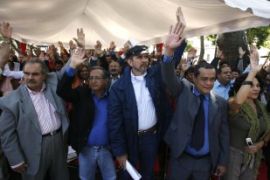‘Radical steps’
The politicians, all loyal to Chavez after opposition parties boycotted the 2005 congressional elections, held their vote in public in a square in Caracas.
The president has already said that he will use the law to decree nationalisations of Venezuela’s largest telecommunications company and the electricity sector, impose new taxes on the rich and greater state control over the oil and natural gas industries.
Chavez’s supporters deny the law constitutes an abuse of power and say radical steps are necessary to accelerate the creation of a more egalitarian society.
The opposition accuses Chavez of being a tyrant in the making, taking a slow approach in following Fidel Castro, the Cuban leader.
Bush condemnation
George Bush, the US president, said Chavez’s expanded powers and possible plans to nationalise key economic interests left him worried about Venezuelan democracy.
“I’m concerned about the Venezuelan people, and I’m worried about the diminution of democratic institution(s), as well as nationalisation efforts that may or may not be taking place,” Bush told Fox News television.
Asked whether Chavez, a perennial thorn in Washington’s side, posed a military threat to US interests, Bush replied: “I think the bigger threat is the diminution of democratic institutions.”
Chavez, who is beginning a fresh six-year term, says the legislation will be the start of a new era of “maximum revolution” during which he will consolidate Venezuela’s transformation into a socialist society.
Chavez is forging a single party to lead his radical reforms, stripping the central bank of autonomy and seeking indefinite re-election.
He also plans to reorganise regional territories and carry out reforms aimed at bringing “power to the people” through thousands of newly-formed communal councils, in which Venezuelans will have a say on spending an increasing flow of state money on neighbourhood projects from public housing to road repaving.
He has requested special powers twice before, once in 1999, shortly after he was first elected, and again in 2001.
In 1999 he was only able to push through two new taxes and a revision of the income tax law after facing fierce opposition in congress.
In 2001, he decreed 49 laws including controversial agrarian reform measures and a law that sharply raised taxes on foreign oil companies operating in Venezuela.
